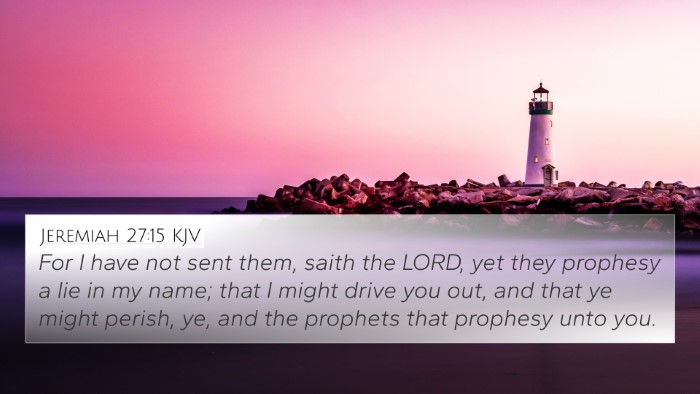Understanding Jeremiah 23:21
Verse: Jeremiah 23:21 - "I did not send these prophets, yet they ran; I did not speak to them, yet they prophesied."
Overview
The verse from Jeremiah highlights a significant theological point about divine authority in prophecy. The Lord addresses false prophets, indicating that not all who claim to speak on His behalf are genuine. This scripture serves as a reminder of the importance of discerning true prophetic messages from false ones.
Commentary Insights
- Matthew Henry: Henry emphasizes that the prophets mentioned in this chapter acted independently of God's instructions. Their eagerness to proclaim messages indicates a personal ambition rather than a divine mandate. He warns against following such prophets, urging believers to seek authentic communication from God.
- Albert Barnes: Barnes points out that God did not commission these prophets, indicating the seriousness of taking on a prophetic role without God's approval. He stresses that true prophets speak only what they have received from God, contrasting them with the self-appointed prophets who lack divine guidance.
- Adam Clarke: Clarke discusses the implications of running without being sent, likening it to a shepherd who leads sheep without being called. He implies that without God's sanction, such actions lead to spiritual danger for both the prophets and the people who follow them.
Thematic Connections
This verse encourages readers to explore the broader theme of prophetic authenticity and the necessity of divine validation in scripture. It also invites comparisons with New Testament teachings on false prophets and the importance of discernment in spiritual matters.
Bible Cross-References
- Jeremiah 14:14: This verse refers to false prophets speaking visions from their own minds rather than God’s direction.
- Ezekiel 13:3:God condemns false prophets who prophesy without His command, reinforcing the importance of divine authority.
- 1 John 4:1: “Beloved, do not believe every spirit, but test the spirits to see whether they are from God; for many false prophets have gone out into the world.” This New Testament verse emphasizes discernment in identifying true prophets.
- Matthew 7:15: Jesus warns against false prophets who come in sheep's clothing but are inwardly ravenous wolves, echoing the theme of discernment.
- Deuteronomy 18:20-22: These verses provide guidelines for identifying true prophets, emphasizing the importance of fulfilled prophecy.
- Romans 16:17-18: Paul advises Christians to watch out for those who create divisions and cause offenses contrary to sound doctrine.
- 2 Peter 2:1: Peter warns that false prophets will arise among the people, introducing destructive heresies, reinforcing Jeremiah's message about false prophecies and their dangers.
Practical Applications
In light of Jeremiah 23:21, believers are encouraged to:
- Exercise Discernment: Always verify the messages from prophetic voices against scripture.
- Seek True Godly Counsel: Prioritize guidance from spiritually mature individuals grounded in the Word of God.
- Foundation in Scripture: Regularly study the Bible to recognize the truth and be less susceptible to deception.
Conclusion
Jeremiah 23:21 serves as a crucial warning concerning the authenticity of prophetic voices in both the Old and New Testaments. By examining connections through cross-referencing biblical texts, one can gain a deeper understanding of the theme of true versus false prophets. It encourages the practice of discernment, ensuring that believers remain anchored in God’s truth.
Key Takeaways on Cross-Referencing
Utilizing tools for Bible cross-referencing can significantly enhance understanding of scripture. Engaging in comparative Bible verse analysis leads to greater insight into God's word and its applications in daily life. Consider utilizing various Bible reference resources to elaborate on themes found in verses like Jeremiah 23:21.
Final Thoughts
Jeremiah 23:21, when studied in conjunction with related scriptures, underlines the importance of divine authority in prophetic messages, encouraging believers to remain vigilant and discerning in their spiritual journey.












